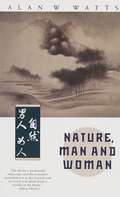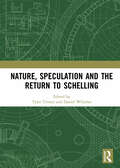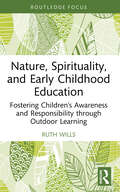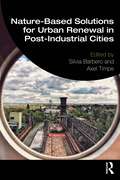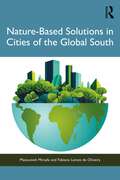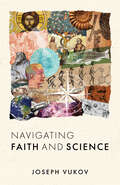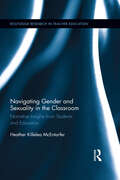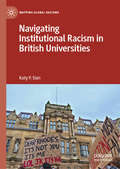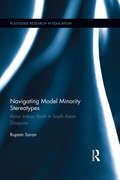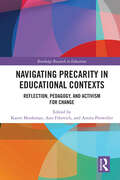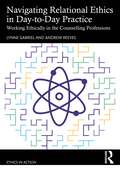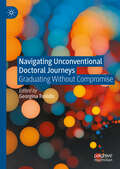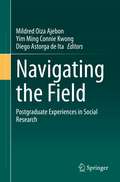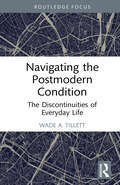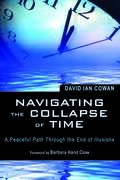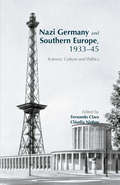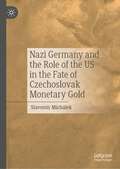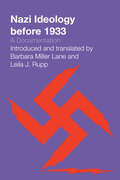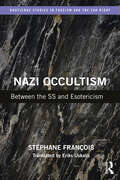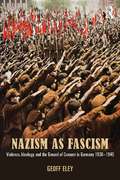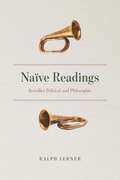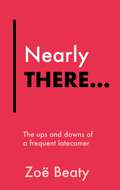- Table View
- List View
Nature, Man and Woman
by Alan W. WattsA provocative and enduring work that reexamines humanity's place in the natural world -- and the spirit's relation to the flesh -- in the light of Chinese Taoism.That human beings stand separate from a nature that must be controlled, that the mind is somehow superior to the body, and that all sexuality entails a seduction -- a danger and a problem-are all assumptions upon which much of Western thought and culture is based. And all of them in some way underlie our exploitation of the earth, our distrust of emotion, and our loneliness and reluctance to love.Few books have challenged those assumptions as directly as this erudite and engaging work by the author of The Way of Zen. Drawing on the precepts of Taoism, Alan Watts offers an alternative vision of man and the universe -- one in which the distinctions between self and other, spirit and matter give way to a more holistic way of seeing. Nature, Man and Woman is a book of great elegance and far-reaching implication -- one of those rare texts that can change the way we think, feel, and love.
Nature, Speculation and the Return to Schelling (Angelaki: New Work in the Theoretical Humanities)
by Daniel Whistler and Tyler TrittenTwo decades ago, Schelling first resurfaced in Žižek’s Indivisible Remainder, and the same argumentative move of redeploying Schellingian themes for contemporary ends has continued to play a significant role in critical theory since (Markus Gabriel, Iain Hamilton Grant, Jean-Luc Nancy). All the articles in this volume attempt to take seriously the idea of Schelling as a contemporary philosopher: Schelling is read in dialogue with key figures in the canon of European philosophy and critical theory (Alain Badiou, Émilie du Châtelet, Gilles Deleuze, Paul de Man, Quentin Meillassoux, Maurice Merleau-Ponty, Gilbert Simondon, Slavoj Žižek), as well as in light of recent trends in analytic philosophy (Brandomian pragmatism, powers-based metaphysics and semantic naturalism) – and such readings are not meant merely to highlight Schellingian influences or resonances in contemporary thinking but rather to challenge and interrogate current orthodoxies by insisting upon the contemporaneity of Schellingian speculation. That is, the aim is both to evaluate and constructively build upon this repeated return to Schelling: to probe, to diagnose and to experiment on the latent Schellingianisms of the present and the future. This book was originally published as a special issue of Angelaki: Journal of the Theoretical Humanities.
Nature, Spirituality, and Early Childhood Education: Fostering Children’s Awareness and Responsibility through Outdoor Learning (Routledge Research in Early Childhood Education)
by Ruth WillsThis novel volume delves into a specific and crucial aspect of early years pedagogy – the intersection between early childhood education and spirituality, offering tips on nurturing spirituality and a sense of connectedness with nature through outdoor learning.With experience both as a scholar and a teacher, the author delves into the ontological and epistemological issues related to outdoor learning and education while keeping accessibility and sustainability at the centre of the volume. Chapters take a comprehensive approach to the exploration of children's innate spirituality and their connection with nature in the context of early childhood education, fusing elements such as a critique of early years policy with philosophy of education and children’s mental health. Using a robust theoretical foundation incorporating philosophical figures such as Froebel, McMillan, Montessori, Dewey and Freire, as well as the inclusion of practical examples from educational settings designed for real-world scenarios, this book reinvigorates the conversation around the holistic development of children by emphasising the importance of nature and child-centred pedagogies.Ultimately exploring avenues that can foster a sense of well-being and social responsibility in children, the book will be of interest to researchers, educators and teacher trainers in the field of early childhood education, environmental education, philosophy of education and teacher education. Policy makers and school leaders may also benefit from this volume.
Nature-Based Solutions for Urban Renewal in Post-Industrial Cities
by Silvia Barbero Axel TimpeThis book, based on the experiences and insights gained during the Horizon 2020 project proGIreg, offers a detailed overview of targeted nature-based solutions and their impacts on various key sustainability areas, guiding readers through the spatial analysis, co-design, and implementation processes of cities in Europe and Asia. Chapters shed light on the challenges and opportunities encountered in each location, including Germany, Italy, Croatia, Bosnia and Herzegovina, Greece, Portugal, Romania and China. It also shares essential lessons learned and a wide range of indicators crucial for assessing the benefits of nature-based solutions on social innovation, circular economy, biodiversity, and health. Finally, the focus of this book shifts to the future of nature-based solutions as catalysts for new and green community economies as well as policies aimed at addressing climate change and urban renewal. The lessons and insights from the projects highlighted in this book will be valuable for urban planners and policymakers worldwide, as well as for a broader audience interested in nature-based solutions and urban regeneration.The Open Access version of this book, available at www.taylorfrancis.com, has been made available under a Creative Commons CC-BY 4.0 license.
Nature-Based Solutions in Cities of the Global South
by Masoumeh Mirsafa Fabiano Lemes de OliveiraThis book explores the practice of Nature-Based Solutions (NBS) in the cities of the Global South. NBS are recognized as a key strategy for achieving sustainable development, and they are being implemented in a variety of sectors such as urban planning, agriculture, forestry, and water management. They offer a wide range of benefits, but there is a gap between research and practice across cities from the Global South. This book promotes implemented urban NBS projects in the Global South to help identify region-specific challenges and opportunities, and to develop more effective and equitable solutions. The presented case studies support resilient planning in the Global South and significantly inform urban debates in the Global North. This book offers pragmatic policy and planning recommendations, providing decision-makers with clear guidance on implementing NBS in urban settings and transforming knowledge into actionable strategies for sustainable and resilient urban development.
Navigating Faith and Science
by Joseph VukovReligious belief is often perceived as being in conflict with science—but does it have to be? Not usually, says Joseph Vukov. In this short, accessible guide, Vukov advances three models for Christians to utilize when navigating the relationship between science and faith: conflict, independence, and dialogue. He argues that dialogue is the ideal model to follow most of the time—but not necessarily all the time. Through a philosophical approach grounded in compelling real-world examples, Vukov shows how no single model can be universally adequate, and how Christians must proceed with discernment according to the nature of the matter at hand. Considering a wide variety of illustrative issues—including cosmology, evolutionary biology, extraterrestrial life, miracles, brain death, and theoretical physics—Vukov introduces and describes each of the three models of interaction between faith and science, surveys their applications, and evaluates the effectiveness of each. Throughout, he encourages Christians to embrace a spirit of intellectual humility and remember that, at their best, faith and science converge in their relentless human pursuit of truth.
Navigating Gender and Sexuality in the Classroom: Narrative Insights from Students and Educators (Routledge Research in Teacher Education)
by Heather Killelea McEntarferGender identity and sexuality play crucial roles in the educational experiences of students, parents, and teachers. Teacher education must more directly address the ways that schools reflect and reproduce oppressive gender norms, working to combat homophobia, transphobia, heteronormativity, and gendered expectations in schools. This volume examines teacher candidates’ experiences with gender and sexuality in the classroom, offering insight and strategies to better prepare teachers and teacher educators to support LGBTQ youth and families. This volume addresses the need for broader, more in-depth qualitative data describing teacher candidates’ responses to diversity in the classroom (including gender, sexuality, race, class and religion). By using pedagogical tools such as narrative writing and positioning theory, teacher candidates explore these issues to better understand their own students’ narratives in deeply embodied ways. This book calls for schools to be places where oppression, in all its complexity, is explored and challenged rather than replicated.
Navigating Institutional Racism in British Universities (Mapping Global Racisms)
by Katy P. SianThis book critically examines the experiences of racism encountered by academics of colour working within British universities. Situated within a critical race theory and postcolonial feminist framework, Sian thoughtfully centres the voices of the interviewed academics, and draws upon her own experiences and reflections through a critical auto-ethnography. Navigating Institutional Racism in British Universities unpacks a range of complex and challenging questions, and engages with the way in which racial politics in the academy interplay and intersect with gender. The book presents a textured narrative around the various barriers facing academics of colour, and enhances understandings of experiences around institutional racism in British universities. Alongside its conceptual and empirical contribution, it develops a series of practical recommendations to encourage and facilitate the active participation of academics of colour in British universities.
Navigating Model Minority Stereotypes: Asian Indian Youth in South Asian Diaspora (Routledge Research in Education #146)
by Rupam SaranThough Asian Indians are typically thought of as a "model minority", not much is known about the school experiences of their children. Positive stereotyping of these immigrants and their children often masks educational needs and issues, creates class divides within the Indian-American community, and triggers stress for many Asian Indian students. This volume examines second generation (America-born) and 1.5 generation (foreign-born) Asian Indians as they try to balance peer culture, home life and academics. It explores how, through the acculturation process, these children either take advantage of this positive stereotype or refute their stereotyped ethnic image and move to downward mobility. Focusing on migrant experiences of the Indian diasporas in the United States, this volume brings attention to highly motivated Asian Indian students who are overlooked because of their cultural dispositions and outlooks on schooling, and those students who are more likely to underachieve. It highlights the assimilation of Asian Indian students in mainstream society and their understandings of Americanization, social inequality, diversity and multiculturalism.
Navigating Precarity in Educational Contexts: Reflection, Pedagogy, and Activism for Change (Routledge Research in Education)
by Karen Monkman Ann Frkovich Amira ProwellerThis volume offers a timely collection of research-based studies that engage with contemporary conditions of precarity across an array of locations, exploring how it is understood, experienced, and acted upon by educators in schools, universities, and nonformal educational spaces. Precarity presents as layered, unpredictable, destabilizing, and rapidly shifting socio-political and economic dynamics, shown here in various forms, including the global pandemic, divisive populist politics, displacement of refugees and the landless, race and gender injustices, and neoliberal policies that constrain educational and social possibilities. Grouped around reflection, educational practice, and social activism, the authors show how educators engage these precarious conditions as they work toward a more interconnected, humane, and just society. This text will benefit researchers, academics, and educators with an interest in social foundations of education, multicultural and social justice education, educational policy, and international and comparative education, sociology and anthropology of education, and cultural studies within education, among other fields.
Navigating Relational Ethics in Day-to-Day Practice: Working Ethically in the Counselling Professions (Ethics In Action)
by Andrew Reeves Lynne GabrielThe first in a new series on ethics in the counselling professions, Navigating Relational Ethics in Day-to-Day Practice contextualises the series and provides a practical ‘how to’ guide for bringing the theoretical concepts of ethics into practice. Lynne Gabriel and Andrew Reeves provide a compelling explanatory narrative on the importance of translating ethical concepts into meaningful pragmatic practice and practitioner tools. They set out key theories, concepts, and contemporary challenges in practice ethics, offering multiple lenses through which to make meaning of complex practice or risk scenarios and settings. Importantly, the book considers contemporary concepts associated with social justice including working in anti-oppressive ways. The chapters feature an array of engaging material, including a round table dialogue on working ethically in day-to-day practice, a ‘toolkit’ for working ethically across multiple contexts and presenting issues, and a rich collection of case examples from the authors’ lived experience.This text supports trainees and practitioners in taking ethical frameworks into their direct work with clients and in their wider role in practice.
Navigating Unconventional Doctoral Journeys: Graduating Without Compromise
by Georgina TsolidisThis edited book delves into the experiences of a group of women who, as mature aged students, took on doctoral studies, persevered and succeeded. Drawing on their own experiences, the group of women from varied backgrounds consider, with hindsight, what prompted them to begin doctoral studies, what hurdles they faced, the strategies that supported their completions and how their doctoral success influenced their future journeys. The editor of the collection, Georgina Tsolidis, was their supervisor. The chapter authors, Stella Coram, Annabelle Leve, Melinda McPherson and Vikki Pollard, explore their motivation to enter doctoral study in turn. These case studies contribute to an overarching analysis of why women who are classified as mature aged students and have child rearing, work and other commitments choose to undertake such a challenging academic journey. The book will be of interest to researchers and postgraduate students of higher education, sociology of education and gender studies.
Navigating the Field: Postgraduate Experiences in Social Research
by Mildred Oiza Ajebon Yim Ming Connie Kwong Diego Astorga de ItaThis volume is a collation of postgraduate fieldwork experiences in social research that provides a platform for early career researchers (ECRs) to be open about the hidden labour of doing postgraduate fieldwork. This book documents diverse fieldwork experiences, gathering critical reflections on ‘the field’ from a wide range of ECRs. The issues presented here go from the process of identifying the field to navigating life in (and after) it, including things that happen in-between. This text shows a different set of methodological considerations in relation to access, ethics, identity, positionality, power and practices, highlighting how ECRs' fieldwork experiences may help broaden traditional frameworks of research. Exploring how postgraduate researchers make sense of these issues and what kind of decisions they make in specific circumstances helps to reveal broader concerns, institutional practices and constraints. Through these reflections, this book makes an important point that there is a need for researchers to document the ‘real story’ behind fieldwork. The honesty and openness of contributors in this volume are positive steps towards fostering a research culture where reflections upon weaknesses and failures are as welcome as presentations of successful fieldwork techniques and methods.The fact that this book is written and edited by ECRs, the topics it presents — both emerging and long-debated but still relevant — and the broad range of approaches make this text unique. We hope these points will make this work useful for researchers of all levels and across disciplines, and that this text will allow the reader to rethink some essential aspects of social research that are often taken for granted. We expect the diverse reflections offered in this book to appeal to researchers across disciplines at different stages of their career and that this will be a useful resource for researchers to map and navigate their own research pathways.
Navigating the Postmodern Condition: The Discontinuities of Everyday Life
by Wade A. TillettDrawing on poststructuralist frameworks, this book examines the way to a radical acceptance of daily discontinuities and difference as it allows us to embrace life in the postmodern world.With each chapter exploring the human relationship with a disjunction in daily life, such as sleeping, forgetting, and multitasking, the author examines overlooked aspects of daily living as fresh data from which to analyze our condition. A phenomenological study of postmodern life, the book provides anecdotes of what it is like to live through these gaps and theorizes how we use these gaps. Using an arts-based methodology, the author also allows the work to mirror the discontinuities which it describes, interrupting the assumption of our lives as continuous and unitary in both form and content. Addressing the vast jumble of contradictions that is our daily experience in this contemporary world, it offers explanation through theory and anecdote and illustrates the path toward radical acceptance, which allows us to see ourselves as beautifully composed of fractures, gaps, and overflow. It will appeal to scholars, researchers, and postgraduate students with interests in poststructuralism, curriculum theory, and art-based research methods.
Navigating the collapse of time: A Peaceful Path Through the End of Illusions
by David Ian CowanThe signs are everywhere: Economic crisis, dramatic hurricanes, floods, earthquakes, and increased rates of species extinction. According to New Age metaphysician David Ian Cowan, we are in the midst of a 25-year transitional period of planetary shift as our solar system approaches the Galactic Photon Band, a shift that is also affecting our perception of time. The Mayans had a term for this transitional period: the "Time of No Time," indicating that, post-2012, time as we know it or experience it may not exist at all or will have changed dramatically. In Navigating the Collapse of Time, Cowan synthesizes a broad range of perspectives about this time of transition, from the writings of the ancient Mayans, Aztecs, and Incas, to speculative theory, quantum physics, philosophy, and the nature of illusion and reality posed by a range of theorists and academics including Ken Carey, Barbara Hand Clow, William Gammill, Zecharia Sitchin, Carl Calleman, Gary Renard, Ken Wapnick, Brent Haskel, and many others. He also lets us know what to expect as events continue to unfold and how to navigate this time of change.
Nazi Germany and Southern Europe, 1933-45: Science, Culture and Politics
by Fernando Clara Cláudia Ninhos Sasha GrishinNazi Germany and Southern Europe, 1933-45 is about transnational fascist discourse. It addresses the cultural and scientific links between Nazi Germany and Southern Europe focusing on a hybrid international environment and an intricate set of objects that include individual, social, cultural or scientific networks and events.
Nazi Germany and the Role of the US in the Fate of Czechoslovak Monetary Gold
by Slavomír MichálekThis book provides a detailed account of the Czechoslovak-American dispute that arose over monetary gold which was forcibly seized by Nazi Germany in the 1930s. After the Second World War, the Czechoslovak gold was found by the American armed forces in the salt mines in Merkers, Germany. Over the next 37 years, it became a part of complicated Czechoslovak-American relations, international economic trade, and political-ideological disputes and conflicts. Only in February 1982, after extensive diplomatic discussions, was a sufficient portion of the gold returned to the Czechoslovak State Bank in Prague. This book maps the story of this gold, how it was seized, blocked and finally, returned. Tracing the path of the monetary gold from its seizure by Nazi Germany in the 1930s to the last decade of the Cold War, the author outlines the main diplomatic steps taken to resolve the dispute, which framed the shape of bilateral relations between Communist Czechoslovakia and the USA. Offering a new contribution to the hisThis book provides a detailed account of the Czechoslovak-American dispute that arose over monetary gold which was forcibly seized by Nazi Germany in the 1930s. After the Second World War, the Czechoslovak gold was found by the American armed forces in the salt mines in Merkers, Germany. Over the next 37 years, it became a part of complicated Czechoslovak-American relations, international economic trade, and political-ideological disputes and conflicts. Only in February 1982, after extensive diplomatic discussions, was a sufficient portion of the gold returned to the Czechoslovak State Bank in Prague. This book maps the story of this gold, how it was seized, blocked and finally, returned. Tracing the path of the monetary gold from its seizure by Nazi Germany in the 1930s to the last decade of the Cold War, the author outlines the main diplomatic steps taken to resolve the dispute, which framed the shape of bilateral relations between Communist Czechoslovakia and the USA. Offering a new contribution to the history of the Second World War and shedding light on East-West relations during the Cold War period, this book will provide useful reading for those researching modern European history, the Cold War, and international history.
Nazi Ideology before 1933: A Documentation
by Barbara Miller LaneThis collection of early writings by leading Nazi intellectuals sheds light on the evolution of Nazi political thought as the party came to power. Barbara Miller Lane and Leila J. Rupp bring together a crucial yet hitherto inaccessible body of material that thoroughly chronicles Nazi ideology before 1933. It includes the extensive writings and programs published by Dietrich Eckart, Alfred Rosenberg, Gottfried Feder, Joseph Goebbels, Gregor and Otto Strasser, Heinrich Himmler, and Richard Walther Darré. Hitler&’s role in the development of Nazi ideology, interpreted here as a very permissive one, is thoroughly assessed. In commentary by the editors, the significance of each Nazi theorist is evaluated at each stage of the history of the party. Lane and Rupp conclude that early Nazi ideology was not a consistent whole but a doctrine in the process of rapid development to which new ideas were continually introduced. By the time the Nazis came to power, however, a group of interrelated assertions and official promises had been made to party followers and to the public. Hitler and the Third Reich had to accommodate this ideology, even when not implementing it. Each selection is accompanied by an introductory note and annotations which clarify its relationship to other works of the author and other writings of the period. Also included are original translations of the &“Twenty-Five Points&” and a number of little-known official party statements.
Nazi Ideology before 1933: A Documentation
by Barbara Miller LaneThis collection of early writings by leading Nazi intellectuals sheds light on the evolution of Nazi political thought as the party came to power. Barbara Miller Lane and Leila J. Rupp bring together a crucial yet hitherto inaccessible body of material that thoroughly chronicles Nazi ideology before 1933. It includes the extensive writings and programs published by Dietrich Eckart, Alfred Rosenberg, Gottfried Feder, Joseph Goebbels, Gregor and Otto Strasser, Heinrich Himmler, and Richard Walther Darré. Hitler&’s role in the development of Nazi ideology, interpreted here as a very permissive one, is thoroughly assessed. In commentary by the editors, the significance of each Nazi theorist is evaluated at each stage of the history of the party. Lane and Rupp conclude that early Nazi ideology was not a consistent whole but a doctrine in the process of rapid development to which new ideas were continually introduced. By the time the Nazis came to power, however, a group of interrelated assertions and official promises had been made to party followers and to the public. Hitler and the Third Reich had to accommodate this ideology, even when not implementing it. Each selection is accompanied by an introductory note and annotations which clarify its relationship to other works of the author and other writings of the period. Also included are original translations of the &“Twenty-Five Points&” and a number of little-known official party statements.
Nazi Occultism: Between the SS and Esotericism (Routledge Studies in Fascism and the Far Right)
by Stéphane FrançoisNazi Occultism provides a serious scholarly study of a topic that is often marred by sensationalism and misinformation. The Morning of the Magicians by Pauwels and Bergier (1960) gave rise to the idea that a secret society with wide powers, the "Thule society", was the hidden and ignored centre of Nazism. The influence of this very real small group is, however, only a fantasy, a myth. The author, a historian specializing in neo-Nazism, looks back on this speculative construction, its origins, its ideological tinkering and the practices which have succeeded in forming a sort of radical and sulphurous counterculture which has created a fascination with esotericism and Nazism and the SS. To better understand it, he also paints a portrait of some of the authors who contributed to this extremist subculture, such as the Italian esotericist Julius Evola, the Argentine anthropologist Jacques-Marie de Mahieu, Chilean neo-Nazi Miguel Serrano, and the writer Jean-Paul Bourre. This book will appeal to scholars, researchers and activists as well as general readers with an interest in the history of Nazism and the occult.
Nazis, Islamic Antisemitism and the Middle East: The 1948 Arab War against Israel and the Aftershocks of World War II (Studies in Contemporary Antisemitism)
by Matthias KüntzelNazis, Islamic Antisemitism and the Middle East demonstrates the impact on the Arab world of Nazi ideology and propaganda in the 1930s and beyond. In 1937, with the brochure "Islam and Judaism," a new form of Jew-hatred came into the world: Islamic antisemitism. The Nazis did everything they could to anchor this new message of hate through their Arabic-language radio propaganda. The book sheds light on this hitherto unknown chapter of Germany's past. It presents new archive findings that show how the image of Jews in Islam changed between 1937 and 1948 under the influence of this propaganda and other Nazi activities. This fresh look at Middle East history allows for a more precise assessment of the present: What exactly is "Islamic antisemitism"? How is it currently manifesting itself in Germany and France? What makes it particularly dangerous? Only when we understand how strongly modern Middle East history is shaped by the aftermath of National Socialism will we be able to correctly interpret the hatred of Jews in this region and its echo among Muslims in Europe and develop adequate countermeasures. This volume will be of interest to those researching antisemitism, Nazi foreign policy and the political history of the Middle East.
Nazism as Fascism: Violence, Ideology, and the Ground of Consent in Germany 1930-1945
by Geoff EleyOffering a dynamic and wide-ranging examination of the key issues at the heart of the study of German Fascism, Nazism as Fascism brings together a selection of Geoff Eley’s most important writings on Nazism and the Third Reich. Featuring a wealth of revised, updated and new material, Nazism as Fascism analyses the historiography of the Third Reich and its main interpretive approaches. Themes include: Detailed reflection on the tenets and character of Nazi ideology and institutional practices Examination of the complicated processes that made Germans willing to think of themselves as Nazis Discussion of Nazism’s presence in the everyday lives of the German People Consideration of the place of women under the Third Reich In addition, this book also looks at the larger questions of the historical legacy of Fascist ideology and charts its influence and development from its origin in 1930’s Germany through to its intellectual and spatial influence on a modern society in crisis. In Nazism as Fascism Geoff Eley engages with Germany’s political past in order to evaluate the politics of the present day and to understand what happens when the basic principles of democracy and community are violated. This book is essential reading not only for students of German history, but for anyone with an interest in history and politics more generally.
Naïve Readings: Reveilles Political and Philosophic
by Ralph LernerOne sure fact of humanity is that we all cherish our opinions and will often strongly resist efforts by others to change them. Philosophers and politicians have long understood this, and whenever they have sought to get us to think differently they have often resorted to forms of camouflage that slip their unsettling thoughts into our psyche without raising alarm. In this fascinating examination of a range of writers and thinkers, Ralph Lerner offers a new method of reading that detects this camouflage and offers a way toward deeper understandings of some of history’s most important—and most concealed—messages. Lerner analyzes an astonishing diversity of writers, including Francis Bacon, Benjamin Franklin, Edward Gibbon, Judah Halevi, Thomas Jefferson, Abraham Lincoln, Moses Maimonides, and Alexis de Tocqueville. He shows that by reading their words slowly and naïvely, with wide-open eyes and special attention for moments of writing that become self-conscious, impassioned, or idiosyncratic, we can begin to see a pattern that illuminates a thinker’s intent, new messages purposively executed through indirect means. Through these experimental readings, Lerner shows, we can see a deep commonality across writers from disparate times and situations, one that finds them artfully challenging others to reject passivity and fatalism and start thinking afresh.
Nearly There...: The ups and downs of a frequent latecomer
by Zoë BeatyWe all obsess about worrying less, but worrying can actually be good for you. Similarly we strive to be proactive and fast - but aren't there hidden benefits to procrastinating? The last thing a parent is meant to do is neglect their offspring, but children do amazing things when you just leave them alone. And at work we spend hours frantically brainstorming, but isn't there a benefit to just lazily staring out of the window? In this short piece, Zoe Beaty explores the benefits of being a frequent latecomer, and why not being on time might actually be the best thing for you.
Nearly There...: The ups and downs of a frequent latecomer (Everything Bad is Good for You #3)
by Zoë BeatyWe all obsess about worrying less, but worrying can actually be good for you. Similarly we strive to be proactive and fast - but aren't there hidden benefits to procrastinating? The last thing a parent is meant to do is neglect their offspring, but children do amazing things when you just leave them alone. And at work we spend hours frantically brainstorming, but isn't there a benefit to just lazily staring out of the window? In this short piece, Zoe Beaty explores the benefits of being a frequent latecomer, and why not being on time might actually be the best thing for you. EVERYTHING BAD IS GOOD FOR YOU is a new series of short pieces dedicated to the much-maligned personality traits that we should actually be promoting. Just as Susan Cain's QUIET showed that introversion is actually a superpower and Sarah Knight made us all realise that not giving a f**k can actually improve our lives, these surprising and entertaining audiobooks will celebrate our perceived flaws - and show why embracing rather than supressing them can be the difference between failure and success.
